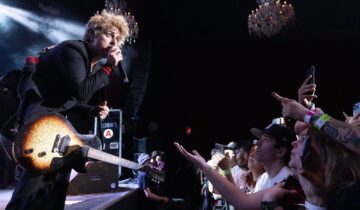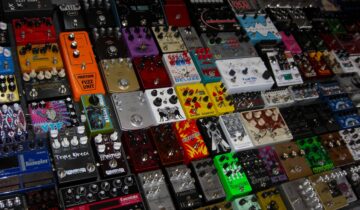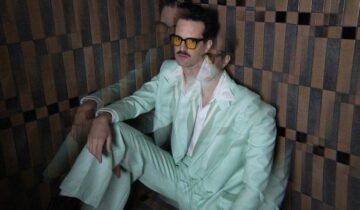 For SF WEEKLY: The Budos Band is perhaps the strangest among the roster that is Daptone Records, the independent funk and soul record label based in Brooklyn. Unlike several of their label mates, they have no lead singer. They curse a lot onstage. Twitter fans refer to them as “Badass horn muhfuggaz.”
For SF WEEKLY: The Budos Band is perhaps the strangest among the roster that is Daptone Records, the independent funk and soul record label based in Brooklyn. Unlike several of their label mates, they have no lead singer. They curse a lot onstage. Twitter fans refer to them as “Badass horn muhfuggaz.”
Their album covers have featured volcanic lava, a scorpion, and a venomous snake. But most noticeable is how un-happy their funky “Staten Island soul” music often is: they produce an almost drone-like Afrobeat rhythm and surround the beat with elements of doom metal, ’70s psychedelic rock, and Ethiopian jazz. Ahead of Budos Band’s show at Mezzanine this Saturday, Nov. 9, I spoke with Budos Band baritone sax player Jared Tankel about the band’s upcoming fourth album, Black Sabbath, and the pitfalls of nostalgia.
What has the Budos Band been up to this past year?
We’ve been steadily chipping away at the next album. This one has been tough. We’ve all gotten busier with life as we entered our 30s, having babies, getting married. Some of us are involved with [Daptone labelmate] Charles Bradley, and he has taken off, which has been amazing. We’ve gone through periods of writer’s block, trying to figure out what the next album is gonna be about. The first three have differences throughout, and show a progression in our sound, but they stand together as a cool thing, as a sound.
Why the writer’s block?
We are still the same group of guys, playing more or less the same music, but since the third album, we’re really trying to go somewhere else, and it’s been a real challenge. A good challenge, but to figure out how to do that in a way that makes sense. We want to take our increased influence from ’70s rock and make that work for Budos, but maybe not with as much of the Afrobeat thing or Ethiopian jazz thing that really shined through in the earlier records.
How’s the album looking so far?
We have 10 solid songs tracked. The majority of work is done, we just need the final push so we have the best stuff there.
Are you working alone or with a producer?
We’re self producing. Gabe Roth from the Daptones produced the first three albums, but on this one we wanted to do our thing on our own. It’s been more natural to write songs for this album. Tom, our guitar player, has his own studio, so we can go in whenever, dictate our own schedule.
You didn’t want to call in a big name producer to push things along?
Mark Ronson’s not getting a call for this one. He’s too busy producing Paul McCartney’s new record [laughs].
What have been some recent highlights for the band?
We kicked off this new year in Sydney, which was incredible, amazing. We had never played there before, but the whole experience, an outdoor festival, with like 50,000 people there, was pretty massive. We did an after-party afterwards, more intimate, which is our bread and butter, like small intimate packed clubs. We did a soul revue at SXSW. It’s been fun to get inspired and explore influences of ours and differentiate ourselves more from our label mates, which is cool.
I’ve always thought Budos Band sounds like soundtrack music to a weird 70s crime flick.
I haven’t gotten a call from Quentin Tarantino to score his next movie yet, but we would love to score the right kind of film. Maybe Tarantino has the wrong number for me?
So how are you differentiating yourselves from other Daptone bands?
’70s rock. Mainly Black Sabbath. They’re heavy, but they are an incredibly soulful band, although that’s not the first word people would use to describe them. There’s this website The Day After the Sabbath, with all these recordings of bands in the ’70s doing heavy psychedelic and blues rock-inspired stuff that is super cool, really obscure. It’s not so much about one band, but sounds and the things that informed those bands, like Hendrix.
When’s the album due? Will there be any guest musicians?
We hope it’s out in time for summer. No guest musicians, but that’s not a bad idea. Maybe we can get a line on [Black Sabbath guitarist] Tony Iommi and get in him in the studio.
How has the band changed most since first starting out?
Our collective vision has gotten a lot stronger. We just trust each other and know each other better at this point. That doesn’t translate into us being able to write an album in a month, but we are much more critical of ourselves, making sure we’re doing our best work. Budos has never been complicated music, and that’s okay. That’s what it is. I think we are actually getting even simpler, but a matter of making the simple the best and making it work, and making it not be boring. Just distilling down our collective vision.
What’s stayed the same?
We are pretty much the same guys, the same lineup, no band turnover. Above everything else, we just like to hang out and drink beers and chill together. Sometimes at practice we barely pick up our instruments. There can be a lot to catch up on. A lot of bands don’t come close to doing that.
What is it about your music that you think resonates with people the most?
Basic bass and drums are supposed to sound good together if they do it right. That creates a backbone for us that immediately gets people into a zone or whatever. It’s easy music to take in different directions. We have this B Boy fan contingent that likes to breakdance to our music, which is awesome. We have the jam-band crowd, but we’re not in that scene. The funk 45 collectors, the funk heads, the world music fans.
What are you most often criticised most for?
Some people think all our songs sound the same. We don’t change it up. We’re not interested in changing up what we do. For some that gets boring. For them, oh well. At our live shows we swear a lot, they can get offended. There have been a couple of funny write-ups saying we are horrible human beings.
You guys joke around a lot onstage, but your music tends to be a bit dark and heavy. Where does that come from?
We take the music seriously. That’s why sometimes the jam-band association is tough for us. A fine line there because we don’t like to noodle and play 15-minute solos. The solo loses some of its integrity if that happens too much. But we are all full of shit when it comes to being onstage. I’m not sure where that all comes from, but we’re trying to incite a lot of energy. I appreciate the irony or the fact that we let the F-bomb fly. We are a rambunctious group of guys. If that offends you, get over it. If there are families, we play it cool, but if it’s midnight, and you’re here drinking a beer, then chill the fuck out.
You’ve been a big part of the soul and funk revival in NY. What’s that been like?
Some people say this is just a nostalgic thing. That is such a load of shit. If you look at pop music, that so sounds like the ’80s or ’90s. You can find nostalgia in anything if you want to. The funk thing has been around since the ’50s in some form, or the ’40s even. Maybe someone prefers the ’80s, but that is nostalgia too. Budos has been playing funk, Afrobeat, and soul all along, but had our own trajectory. If we wanted a genre, it would still be Afrofunk or something in that neighborhood — our references are form the ’70s. it’s been great to be part of the Daptone family and witness this scene develop. Sometimes it sounds like a particular decade, sometimes its different, but in the end it’s been a lot of fun.
Image by Kisha Bari, courtesy of Budos Band



